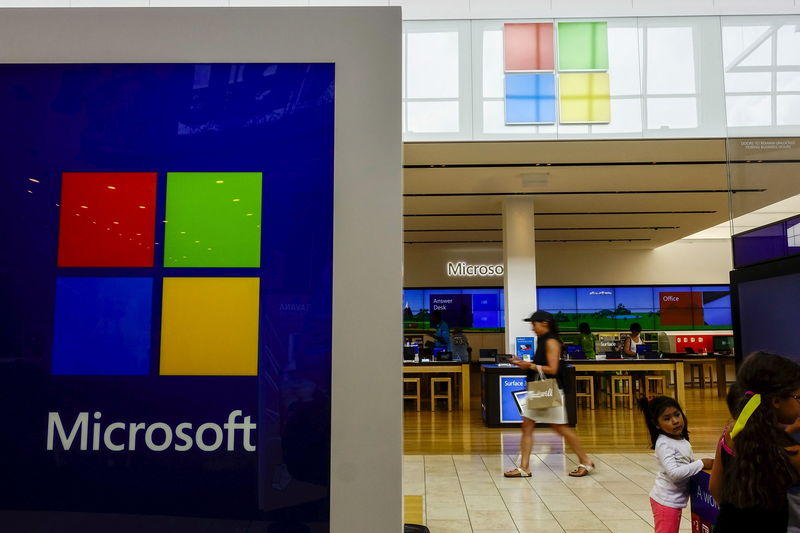This post was originally published on this site

(Reuters) -Microsoft Corp on Tuesday hit Wall Street targets for cloud services revenue, but that was not enough for some of the most optimistic investors and shares fell 4% in extended trade.
Investors are seeking assurances that the enterprise cloud business is still growing strongly and will also scrutinize upcoming financial reports from Microsoft (NASDAQ:MSFT) rivals Amazon and Google.
Total Microsoft revenue for the second quarter beat expectations but the outperformance did not flow through to the Azure cloud service. Azure revenue growth of 46% was in line with analyst expectations as compiled by Visible Alpha, but demonstrated a steady drop from fiscal 2020 when growth was in the 60% range.
Following Microsoft’s disappointing report, shares of Apple Inc (NASDAQ:AAPL), Amazon.com Inc (NASDAQ:AMZN), Alphabet (NASDAQ:GOOGL) Inc and Tesla (NASDAQ:TSLA) Inc all fell more than 1%.
David Wagner, portfolio manager at Aptus Capital Advisors, said the pace of growth in Azure, the company’s fastest-growing segment and a Wall Street focus, was “concerning” and Wedbush analyst Dan Ives said the stock fell because some Wall Street bulls had expected 48% growth.
“It all comes down to guidance on the call, this will be the focus for the Street to gauge broader enterprise/cloud spending into the rest of 2022 in this white knuckle backdrop,” Ives wrote. He called Microsoft’s performance “robust” and a sign that the company “is continuing to see strength in the field”.
Microsoft has become one of the most valuable companies in the world https://www.reuters.com/technology/apple-set-hand-crown-worlds-most-valuable-company-microsoft-2021-10-29 by betting heavily on corporate software and services, especially its cloud services and the movement to the Web of its Outlook email and calendar software, known as Office 365.
The switch to working and learning from home during the pandemic also attracted more users to Microsoft’s office communication software and services such as Teams and Office 365. And demand for cloud services from Microsoft and rivals Amazon.com and Alphabet surged as the pandemic outbreak accelerated a shift online.
Scott Kessler, vice president and global lead at Third Bridge in New York, said one major question was related to the sustainability of growth driven by the pandemic.
“We’ve seen many darlings of the early COVID period becoming fallen angels. Now many wonder to what extent Microsoft’s revenues were pulled forward.”
Revenue from Microsoft’s biggest segment, which offers cloud services and includes Azure, its flagship cloud offering, rose 26%, while the business that houses its Office 365 services increased 19% in the quarter.
Net income rose to $18.77 billion, or $2.48 per share, from $15.46 billion, or $2.03 per share, a year earlier.
The company said revenue rose to $51.73 billion in the three months ended Dec. 31, from $43.08 billion a year earlier.
Analysts on average had expected revenue of $50.88 billion, according to Refinitiv data.
Investors are also focused on Microsoft’s proposed $69 billion acquisition of Activision Blizzard Inc (NASDAQ:ATVI) https://www.reuters.com/technology/microsoft-buy-activision-blizzard-deal-687-billion-2022-01-18, announced on Jan. 18, a huge expansion for its gaming division. It also broadens the company’s efforts in the so-called metaverse, or the merging of online and offline worlds, which will have corporate and consumer applications.
Microsoft said the Activision Blizzard deal would help boost Xbox content and services revenue when it closes. Growth has fallen sharply from a high in the fourth quarter of fiscal 2020 when Xbox content and services grew 65%. In the past quarter, revenue rose 10%, while a year ago it rose 40% in the same quarter.
“They have a ton of great content and franchises. And that’s where that revenue would eventually come in when the deal lands, for sure,” said Brett Iversen, general manager, investor relations at Microsoft, referring to the Activision deal.




